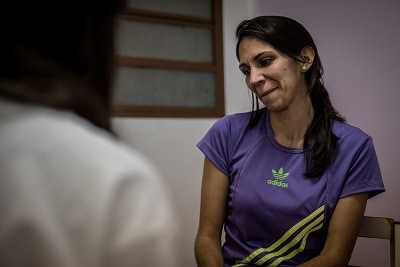The capital of Venezuela, Caracas, is one of the cities with the highest homicide rates in the world. In recent years, criminal violence has increased in the neighbourhoods on the outskirts, which are the most vulnerable. In these areas, people are continuously exposed to theft, murder, extortion, armed assaults, express kidnapping, and forced recruitment. This situation is affecting community life and particularly the mental health of the population.
Mafias and criminal gangs use violence as a tool to exert control over the territory. These urban areas see the coming together of drug dealing, kidnapping and extortion. At the same time, there has been an increase in petty crimes and widespread daily violence, resulting in increasing numbers of victims and affected people.
“They took my husband’s life at the door of our house as we were leaving for work. He worked in security, and they took his life to steal his pistol”, recounts Yanieri, a patient who has been receiving psychological care from MSF for several weeks at Andy Aparicio school in the La Vega parish. “Obviously, I felt dark and felt like I wasn’t going to escape from where I was. Before, I was much more nervous and anxious. With the therapy, I have learnt to control my emotions”, she adds.

leaving for work. For a couple of months, she has been
attending therapy sessions with an MSF psychologist.
Photo: Marta Soszynska/MSF
Late last year, Doctors Without Borders/Médecins Sans Frontières (MSF), in collaboration with the local organisation Fe y Alegría, started to provide support in the neighbourhoods of Petare, in the municipality of Libertador, and in La Vega, in the municipality of Sucre, offering mental health care to people affected by urban violence and offering comprehensive support to victims of sexual violence.
Violence has consequences: neighbours live in fear, are depressed and suffer from distress and anxiety.
In 2016, MSF teams treated 210 cases of intentional physical injury: they heard tales of confrontations with gangs, dealt with victims of sexual violence and helped people mourning for the loss of a murdered family member. Psychologists of the humanitarian medical organisation provided 367 one-on-one psychological consultations. They also gave medical and psychological care to 57 survivors of sexual violence. 42% of patients receiving care were children and adolescents.
“The tragedy that people carry inside causes them to make many mistakes, starting with the mistreatment of children”, points out Caterina, a community leader in La Vega.
“We work with them – children and adolescents in schools. Through games and discussions, we are able to detect cases of intentional physical injury. We have seen how these children perceive violence, how they react to fear, anger, sadness” states Suhail Izaguirre, an MSF psychologist.
“For us, MSF is an answer. We realised that there are some young boys that require special attention, lads that are getting involved in gangs. The effects of violence are very noticeable here”, concludes Maria Saenz, a social worker from Andy Aparicio school of Fe y Alegría.
Clashes between gangs, which are known in these neighbourhoods as “delinquents”, are common. It is common to hear gun shots at all times of the day. People are afraid to go outside. Most of these shocks come from the Petare neighbourhood, a population of over 400,000 inhabitants, consisting of neighbourhoods where there are invisible limits or borders which you can’t cross.
“The violence is shocking, really shocking”, adds Caterina. “Recently we have been feeling harassed because we have lots of members of criminal groups who have moved in from elsewhere.”
“I feel safe here in my community, but I start to feel the adrenaline rush if I go in the other parts. After 8.00 p.m. at night, people don’t leave their houses”, comments a volunteer from one of the Fe y Alegría schools.
The role of community is key
Carolina Lopez, director of the project’s mental health activities, speaks of the importance of community involvement. “We have created alliances with other organisations to empower community leaders and educators in mental health promotion”, she says. Last year there were 7,807 volunteers.
“These psychopedagogic activities include training and workshops tackling issues such as anxiety management, fear, psychological first aid and the prevention of sexual violence, among others”, says López.
The objective of these trainings is not just to raise awareness in the population about the importance of mental health care, but it is also a strategy to prevent and detect cases of sexual violence so that they can be referred to medical care and specialised psychology services.












